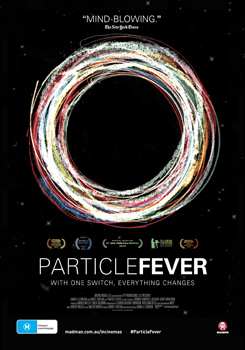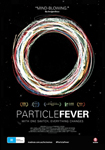Mark Levinson Particle Fever Interview

Mark Levinson Particle Fever Interview
Particle Fever
Cast: Martin Aleksa, Nima Arkani-Hamed, Savas Dimopoulos
Director: Mark Levinson
Genre: Documentary
Rated: M
Running Time: 97 minutes
Synopsis: Imagine being able to watch as Edison turned on the first light bulb, or as Franklin received his first jolt of electricity.
For the first time, a film gives audiences a front row seat to our generation's most significant and inspiring scientific breakthrough as it happens. Particle Fever follows six brilliant scientists during the launch of the Large Hadron Collider, marking the start-up of the biggest and most expensive experiment in the history of the planet, pushing the edge of human innovation.
As they seek to unravel the mysteries of the universe, 10,000 scientists from over 100 countries joined forces in pursuit of a single goal: to recreate conditions that existed just moments after the Big Bang and find the Higgs boson, potentially explaining the origin of all matter. But our heroes confront an even bigger challenge: have we reached our limit in understanding why we exist?
Directed by Mark Levinson, a physicist turned filmmaker, and masterfully edited by Walter Murch (Apocalypse Now, The English Patient), Particle Fever is a celebration of discovery, revealing the very human stories behind this epic machine.
Particle Fever
Release Date: November 27th, 2014
Website: www.particlefever.com/
Interview with Mark Levinson
Question: How did this film initially come about?Mark Levinson: David Kaplan had the idea, I think maybe as early as 2006, to somehow record the start-up of the Large Hadron Collider as it was going to be a nearly unprecedented moment in the history of science. This machine, when turned on, was going to be able to give answers to some of the deepest questions we had about how the universe works. People had been waiting 50 years to see if certain basic ideas were true, and suddenly they would know whether they were on the right track, or if maybe it was all a waste and they needed to go back to square one. So, David saw the dramatic potential of the story and as an active physicist himself, he was able to see and feel the anticipation and anxiety in the people he knew.
I met David in the fall of 2007. I had been in the narrative feature world and was actually invited to pitch a script I had written to a group of Angel Film Investors. The organiser of the event told me that some physicist had applied to make a documentary, but he had no film experience and wanted to make a film about an experiment that nobody knew would even work, so they didn't choose it to be presented. I, of course, thought it sounded like a potentially GREAT film, about a field I knew and with real dramatic narrative potential for a film. So I got David's contact information and tracked him down. I think we quickly realised we were on the same page about making a very dramatic, character-based, real and true film about this unique moment in history - unlike any other 'science" film.
Question: You received a doctorate in theoretical particle physics. How did the transition into filmmaking happen?
Mark Levinson: The transition actually seemed remarkably straightforward to me. What entranced me about physics was the profound beauty and elegance of the theories, and the magic and mystery in the fact that abstract symbols encoded deep truths about the universe. I made the transition to film when I recognised an alternate avenue for exploring the world around us, in the human dimension, that also seemed mysterious and magical. For many years, I harbored the hope that I could find some project that could weave together the two seemingly disparate strands of my life. The start-up of the Large Hadron Collider provided the perfect combination of both a profound scientific and human endeavor. One of the characters in Particle Fever speculates, 'Why do we do science? Why do we do art? It is the things that are not directly necessary for survival that make us human."
Question: How many years did it take to do this film and what were the challenges?
Mark Levinson: David and I met at the end of 2007 and really started working on the film, essentially full-time, at the beginning of 2008. The big announcement of the discovery of the Higgs boson on July 4, 2012 became a great end for the film. It took another year to put it all together into the finished film.
There were many challenges in filming. First, there were 10,000 people involved in the experiment. We always knew we wanted it to be character-based, but who do we choose? People were also scattered all over the globe. How, on a rather limited budget, do we cover people all around the world?
Also, particular to this story, a story about real scientific discovery, we constantly had to decide when and where something significant might occur. And how long do we continue filming? What if there was no definitive discovery?
One of the things that was not a particular challenge to me, luckily, because of my physics background, was understanding what was going on.
In terms of actually putting the film together, the biggest challenge certainly was making the film accessible to a non-specialist audience, while at the same time remaining authentic.
Question: How did you address the challenge of capturing the visual elements of the Large Hadron Collider?
Mark Levinson: We always wanted the film to be visually striking. We shot HD and used very experienced cinematographers who specialised in documentaries. Claudia Raschke-Robinson was our principal DP, and Claudia has a great visual sense. She's also done a lot of still photography. You often don't have control of a situation when things are happening in real time, and certainly don't have a chance to move something like the ATLAS experiment, as big as a 7 story building, to suit your visual needs, but we always tried to be aware of visual themes – scale, symmetry, beauty.
Question: Who or what influenced your film?
Mark Levinson: I'd say the big influence for me was really more narrative dramatic films. This is my first documentary. I worked on many narrative films, directed one low-budget feature myself, and so I was always thinking story in the back of my mind.
Question: What do you think is the drive behind man's innate urge to understand the world around you?
Mark Levinson: As Savas says at the end of the film, the pursuit of these things, not really necessary for survival, are what make us human. There is a continuous line, beginning with the first symbolic representation of our "environment" with the cave paintings at Chauvet, to the sophisticated equations of physics that we think describe the deepest, inner workings of the universe. Fabiola quotes Dante as well about this: there is something fundamental about this that distinguishes us from animals. Man has always tried to make sense of the world around him and to understand his place in a vast universe.
Question: What was the most surprising thing you learned?
Mark Levinson: It takes a long time to make a documentary!
Question: What do you hope people take away from the film?
Mark Levinson: I hope they have a certain appreciation for the wonderful, monumental achievement that is embodied in particle physics. It really is truly amazing that we've been able to come up with these incredibly complicated theories about things we can never actually physically see with our eyes, in a sense an entirely invisible world, but it has rules and laws and we can make predictions about things that we CAN see, and we build this huge machine, and then some theoretical ideas scribbled down on paper result in some electronic blip in this gigantic machine – and it's just what we predicted! This is the cutting edge of our understanding of how the universe works.
I also hope they really see how human the people are that do this.
Question: What does the film say about the world we live in?
Mark Levinson: That the universe, in its extraordinary complexity, can be understood in terms of some basic principles, by a handful of mathematical equations, that we, with our tiny brains, can comprehend. At least at some level.
Question: Can protons and antiprotons annihilate into photons?
Mark Levinson: Yes. But Angels and Demons was total fiction.
Particle Fever
Release Date: November 27th, 2014
Have You Seen This?
MORE
- Mission: Impossible Fallout
- Glenn Close The Wife
- Allison Chhorn Stanley's Mouth Interview
- Benicio Del Toro Sicario: Day of the Soldado
- Dame Judi Dench Tea With The Dames
- Sandra Bullock Ocean's 8
- Chris Pratt Jurassic World: Fallen Kingdom
- Claudia Sangiorgi Dalimore and Michelle Grace...
- Rachel McAdams Disobedience Interview
- Sebastián Lelio and Alessandro Nivola...
- Perri Cummings Trench Interview




